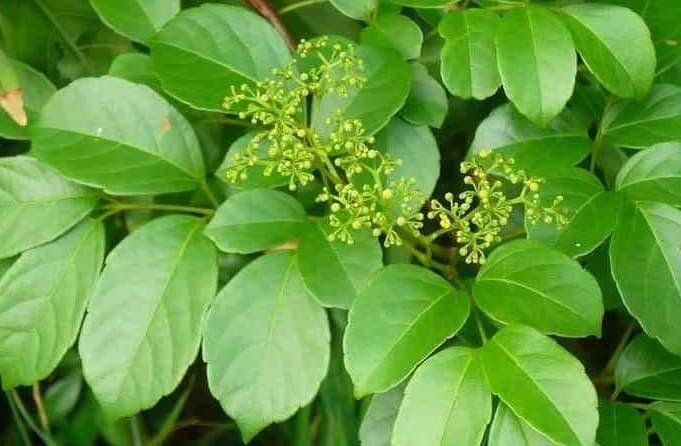1. Characteristics and uses of the Gynostemma pentaphyllum plant
- 1. Characteristics and uses of the Gynostemma pentaphyllum plant
- 2. Medicinal remedies from the Gynostemma pentaphyllum plant
- 3. Notes on using Gynostemma pentaphyllum for medicinal purposes.
Ampelopsis cantoniensis ( scientific name Ampelopsis cantoniensis, belonging to the Grape family) is a climbing plant with slender, cylindrical branches and tendrils opposite the leaves, branching into 2-3 stems.
Leaves are twice compound, bearing 7-12 thin, brittle leaflets with low serrated margins and 4-5 pairs of lateral veins; stipules are scale-like, nearly round. Inflorescence opposite the leaves, with 4-5 branches; flower buds are egg-shaped. Fruit is an oval berry, 6 x 5 mm, containing 3-4 seeds.
Traditional folk remedies often use the leaves of the Gynostemma pentaphyllum plant to make a tea substitute, to improve appetite and relieve stomach aches. In Traditional Chinese Medicine, Gynostemma pentaphyllum is used as a remedy to clear heat and eliminate dampness.
Parts used for medicine: The whole plant, including the leaves and stems, or just the roots.
Uses of Gynostemma pentaphyllum: According to Traditional Chinese Medicine, Gynostemma pentaphyllum has a sweet and bitter taste, a cooling nature; it acts on the Heart and Spleen meridians; it has the effects of clearing heat, detoxifying, relieving rheumatism, treating colds, and curing joint pain...
According to modern medical research: A decoction of Gynostemma pentaphylla has analgesic effects, kills Helicobacter pylori (HP) bacteria, and reduces gastritis. The Vietnam Institute of Traditional Medicine has used Gynostemma pentaphylla extract to treat peptic ulcers, while Hanoi University of Pharmacy has researched and developed a tablet form for treating gastritis with good results.
Studies in China have shown that Gynostemma pentaphyllum has antibacterial effects against salt-tolerant bacteria (Halobacteria), Staphylococcus, and Pseudomonas aeruginosa; it has been used to treat food poisoning caused by contaminated food with salt-tolerant bacteria and inflammatory diseases such as pneumonia, arthritis, and urinary tract infections caused by Staphylococcus or Pseudomonas aeruginosa.
2. Medicinal remedies from the Gynostemma pentaphyllum plant

Fresh Gynostemma pentaphyllum leaves are used in a traditional medicine to treat gastritis caused by H. pylori bacteria.
2.1 Using Gynostemma pentaphylla to treat gastritis caused by Helicobacter pylori (HP) bacteria: Brew 20-40g of fresh Gynostemma pentaphylla (10-20g dried, roasted) in water and drink warm, about 30 minutes before meals, continuously for 10-15 days; rest for 5-7 days, then continue another course of treatment until symptoms such as abdominal pain, heartburn, belching, acid reflux, indigestion... subside.
2.2 Treatment for rheumatic pain: Take a sufficient amount of fresh Gynostemma pentaphyllum leaves, crush them, heat them in a pan, then wrap them in a thin cloth and apply directly to the painful area.
2.3 Support for the prevention and treatment of malaria: 60g of Gynostemma pentaphyllum, 12g of Cynodon dactylon root, 60g of Phellodendron amurense leaves, 12g of Citrus grandis leaves, 12g of Perilla frutescens, 12g of Melia azedarach root. Boil these herbs in 400ml of water until only about 150ml remains. Drink while the decoction is still warm. This remedy is for preventative purposes only, so use one dose every three days.
2.4 Treating colds and sore throats: Take 30g of dried Gynostemma pentaphyllum, boil it in water and drink it like tea throughout the day, while it's still warm.
2.5 Remedy for bacterial plant poisoning: 50g of fresh Gynostemma pentaphyllum root, 15g of fresh ginger; decoct with 200ml of water until only 100ml remains; drink while the medicine is still warm.
2.6 Support and treatment for sciatica: Boil 50g of fresh tea vine root or stem in water and drink the decoction once a day; combine this with applying crushed fresh tea vine leaves, heated, to the painful area.
3. Notes on using Gynostemma pentaphyllum for medicinal purposes.
- Patients can brew or steep the Gynostemma pentaphyllum tea to drink throughout the day, but it should be done in courses of treatment. Each course lasts 15-30 consecutive days.
Dosage: 30-50g of Gynostemma pentaphyllum tea per day; maximum 50-60g of dried Gynostemma pentaphyllum tea per day, divided into 2-3 doses.
- It is recommended to divide the amount of Gynostemma pentaphyllum tea into two portions when brewing/steeping it for daily consumption so that the herbal decoction can be used immediately and not left out for too long.
- It's better to drink the medicine while it's still warm than cold; if the medicine cools down, you can reheat it.
- The herbal tea made from Gynostemma pentaphyllum should only be consumed on the same day; do not keep it until the next day.
- Gynostemma pentaphyllum tea has strong cooling, detoxifying, and antibacterial effects; frequent use can disrupt the body's internal balance and may have adverse health effects. Therefore, do not use Gynostemma pentaphyllum tea in excessive amounts and consult a doctor if necessary.
Please watch the video for more information:
Source: https://suckhoedoisong.vn/cay-che-day-chua-benh-gi-16925110913293456.htm


![[Photo] General Secretary To Lam attends the inauguration ceremony of Si Pa Phin multi-level boarding school.](/_next/image?url=https%3A%2F%2Fvphoto.vietnam.vn%2Fthumb%2F1200x675%2Fvietnam%2Fresource%2FIMAGE%2F2026%2F01%2F31%2F1769840655651_ndo_br_z7486540481209-f37c7e00a962aec2a061c64b7db569ef-jpg.webp&w=3840&q=75)































































































![OCOP during Tet season: [Part 3] Ultra-thin rice paper takes off.](/_next/image?url=https%3A%2F%2Fvphoto.vietnam.vn%2Fthumb%2F402x226%2Fvietnam%2Fresource%2FIMAGE%2F2026%2F01%2F28%2F1769562783429_004-194121_651-081010.jpeg&w=3840&q=75)


![OCOP during Tet season: [Part 2] Hoa Thanh incense village glows red.](/_next/image?url=https%3A%2F%2Fvphoto.vietnam.vn%2Fthumb%2F402x226%2Fvietnam%2Fresource%2FIMAGE%2F2026%2F01%2F27%2F1769480573807_505139049_683408031333867_2820052735775418136_n-180643_808-092229.jpeg&w=3840&q=75)





Comment (0)